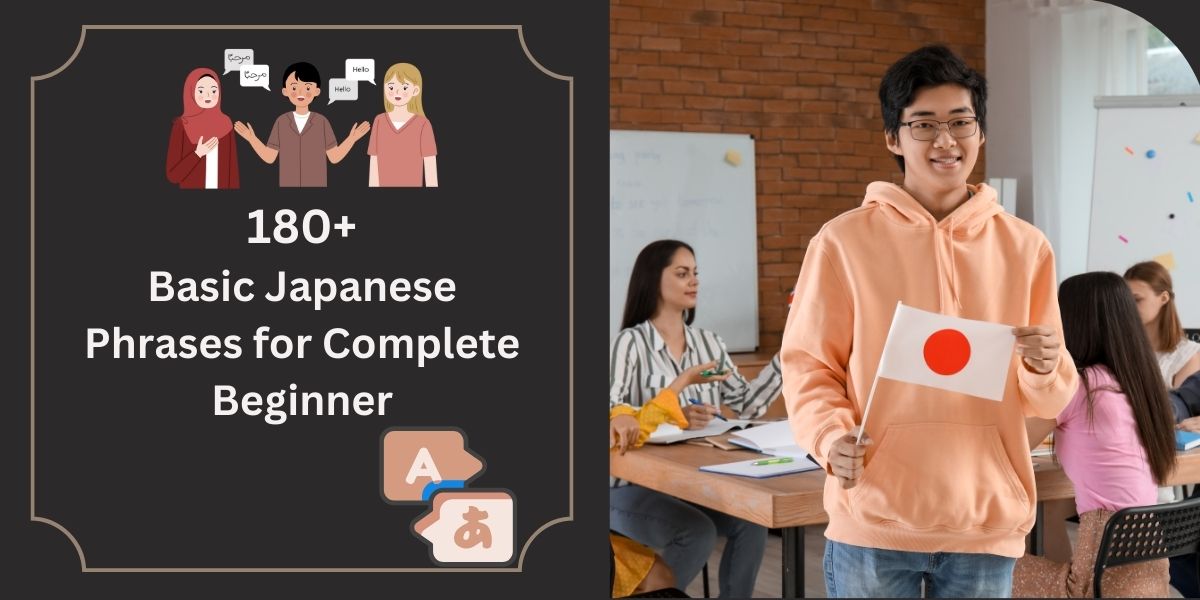Are you a foreign student, visitor, or tourist new to the world of Japanese? Welcome to this creative space of basic and essential Japanese phrases. This is going to be a wonderful experience. Actually, the language is quite easy to assimilate, especially when broken down properly.
We’ve strategically arranged the most basic Japanese phrases in a way that’ll boost your understanding and have you speaking confidently in a short while. Below are the 180+ most essential Japanese phrases for complete beginners.
These basic Japanese phrases help if you are a student, visitor, businessperson, or tourist who needs a way to communicate in public, like a bus, train station, restaurant, hotel, and more.
Brief History of Japanese Language
According to Wikipedia, the origins of the Japanese language are unknown, but it is classified as a member of the Japonic language family, which includes Japanese and the Ryukyuan languages spoken in the Ryukyu Islands.
While some linguistic evidence shows relationships to languages like Korean and Altaic languages, clear links remain questionable.
However, Japan has kept its unique traits, such as its writing systems (hiragana, katakana, and kanji), honorific, and politeness levels.
But today, Japanese is spoken by millions of people in Japan and Japanese-speaking communities worldwide, and it remains a vibrant and evolving language.
8 Common uses of Japanese Language
The Japanese language is used in numerous contexts and situations, both domestically within Japan and globally. Here are some significant locations where Japanese is used:
1. Daily Communication
Japanese is the main language spoken in Japan for everyday communication among its people. It is used in conversations, written communication, and interactions in different settings, such as homes, schools, workplaces, and public places.
2. Business and Commerce
Japanese as a language is also essential for conducting business in Japan. It is used in meetings, negotiations, presentations, and correspondence in companies and organizations across different industries.
3. Education
Japanese is the medium of instruction in schools and universities throughout Japan. Students learn subjects ranging from mathematics to literature in Japanese.
Additionally, Japanese language education is offered to non-native speakers both in Japan and in other countries. So if you plan on going to Japan to study, you need some basic Japanese phrases.
4. Media and Entertainment
Japanese is widely used in various forms of media and entertainment, including television, radio, newspapers, magazines, books, movies, and music.
Manga (comic books) and anime (animation) are particularly popular forms of entertainment that have gained international recognition.
5. Technology and Innovation
Japan is known for its advancements in technology and innovation. Japanese is used in technical fields such as engineering, electronics, robotics, and automotive industries. Many technical documents, manuals, and patents are written in Japanese.
Therefore, understanding the basic Japanese phrases can help you as a tech student or businessperson who wants to venture into a business or school in Japan.
6. Tourism
Japan attracts millions of tourists each year, and knowledge of basic Japanese phrases can be helpful for travelers to navigate and communicate effectively during their visits.
7. Cultural and social events
The Japanese language also plays a significant role in traditional cultural practices, ceremonies, festivals, and social events in Japan. Understanding basic Japanese phrases and etiquette can enhance one’s experience of Japanese culture.
8. Diplomacy and International Relations
Japanese as a language is also used in diplomacy and international relations between Japan and other countries. It is spoken in official meetings, diplomatic exchanges, and international conferences, which makes understanding the basic Japanese phrases really important.
180+ Basic Japanese Phrases
Japanese is learned by millions of people worldwide as a second language. Many people learn Japanese out of interest in Japanese culture, for academic or job reasons, or as a means of communication while traveling or working in Japan.
Below is a list of basic Japanese phrases and what they mean.
Greeting phrases in Japanese
Japanese people utilize greeting phrases in a variety of social settings and exchanges. Though they don’t all sound like greetings, they are all connected to greetings in basic Japanese expressions.
Here are a few typical greeting expressions:
- 1. こんにちは (Konnichiwa): Hello or Good afternoon
- 2. おはようございます (Ohayou gozaimasu): Good morning
- 3. さようなら (Sayounara): Goodbye
- 4. こんばんは (Konbanwa): Good evening
- 5. お元気ですか (Ogenki desu ka): How are you?
- 6. 元気です (Genki desu): I’m fine
- 7. おやすみなさい (Oyasuminasai): Good night
- 8. じゃね (Ja ne): See you later
- 9. どういたしまして (Douitashimashite): You’re welcome
Common Phrases in Japanese
Common phrases in Japanese cover a wide range of expressions used in everyday communication.
These phrases also serve various functions, from agreeing to disagreeing, expressions of thanks to apologies, and basic social interactions.
- 10. すみません (Sumimasen): Excuse me or I’m sorry
- 11. いいえ (Iie): No
- 12. はい (Hai): Yes
- 13. お願いします (Onegaishimasu): Please
- 14. わかりません (Wakarimasen): I don’t know
- 15. ごめんなさい (Gomen nasai): I’m sorry
- 16. わかりました (Wakarimashita): I understand
- 17. 行ってきます (Ittekimasu): I’m off (used when leaving home)
- 18. ただいま (Tadaima): I’m home (used when returning home)
Introductory phrases in Japanese
In Japanese communication, introductory phrases are important for setting the tone, expressing politeness, and building rapport.
They also play a significant role in starting conversations, formalities, and written discourse. Here are some popular introductory phrases in Japanese:
- 19. お名前は何ですか (Onamae wa nan desu ka): What is your name?
- 20. 私の名前は [your name] です (Watashi no namae wa [your name] desu): My name is or I am [your name]
- 21. 私は…から来ました (Watashi wa… kara kimashita): I’m from…… [Add where you’re from in the ellipsis.]
- 22. これは私の友達です (Kore wa watashi no tomodachi desu): This is my friend
- 23. 出身はどこですか (Shusshin wa doko desu ka): Where are you from?
- 24. 何歳ですか (Nan-sai desu ka): How old are you?
- 25. 学生ですか (Gakusei desu ka): Are you a student?
- 26. 仕事は何をしていますか (Shigoto wa nani o shiteimasu ka): What do you do for work?
- 27. お大事に (Odaiji ni): Take care.
- 28. 学生です (Gakusei desu) “I’m a student.” Its used to respond to someone who asks you who you are.
- 29. I’m a tourist: 観光客です (Kankoukyaku desu)
- 30. よろしくお願いします (Yoroshiku onegaishimasu) “Nice to meet you,” “Please treat me well,” or “I look forward to working with you.” It’s used to express goodwill and cooperation at the beginning of a relationship or interaction.
- 31. 初めまして (Hajimemashite): “Nice to meet you,” used when meeting someone for the first time.
- 32. ご挨拶申し上げます (Goaisatsu moushiagemasu): “I would like to give you my greetings,” a formal way of introducing oneself or showing greetings.
- 33. どうぞよろしくお願いします (Douzo yoroshiku onegaishimasu): “Please treat me well” is a polite expression used when requesting a favor or help, often followed by an introduction or request.
Complimentary phrases in Japanese
When you want to show someone you appreciate, admire, or praise them in Japanese, you can use a complimentary term. Here are some popular Japanese terms for compliments, along with their English translations:
- 34. すごい (Sugoi): Amazing
- 35. お誕生日おめでとうございます (Otanjoubi omedetou gozaimasu): Happy birthday!
- 36. おめでとうございます (Omedetou gozaimasu): Congratulations
- 37. ありがとう (Arigatou): Thank you.
- 38. かっこいいですね (Kakkoii desu ne): You’re cool!
- 39. ありがとうございます (Arigatou gozaimasu): Thank you very much.
- 40. 優しいですね (Yasashii desu ne): You’re kind.
- 41. きれいですね (Kirei desu ne): You’re beautiful.
- 42. 素敵な笑顔ですね (Suteki na egao desu ne) – You have a lovely smile!
- 43. すごいですね (Sugoi desu ne): That’s amazing!
Complimentary phrases at work in Japanese
If you’re going to be working with Japanese coworkers, you might as well learn some Japanese compliment phrases to use when you want to show your appreciation, admiration, or praise.
The following are some typical Japanese compliments and their English translations:
- 44. 素晴らしいですね (Subarashii desu ne): That’s wonderful!
- 45. お疲れ様です (Otsukaresama desu): Thank you for your hard work. (used among colleagues at work)
- 46. 頑張ってください (Ganbatte kudasai): Please do your best.
- 47. すばらしい仕事ですね (Subarashii shigoto desu ne): That’s excellent work!
- 48. 上手ですね (Jouzu desu ne): You’re skilled.
- 49. いい笑顔ですね (Ii egao desu ne): You have a nice smile.
- 50. 応援しています (Ouen shiteimasu): I’m rooting for you.
- 51. おめでとうございます (Omedetou gozaimasu): Congratulations.
- 52. すてきですね (Suteki desu ne): That’s fantastic!
- 53. いい仕事をしましたね (Ii shigoto o shimashita ne): You did a great job.
Numbers 1–10 in Japanese
Numbers in Japanese are stated using a combination of kango, a local term, and kanji, which are letters from Chinese. The numbers are also structured around ten, just like in English. A quick primer on Japanese numerals is this:
- 54. 一 (Ichi): one
- 55. 二 (Ni): two
- 56. 三 (San): three
- 57. 四 (Shi/Yon): four
- 58. 五 (Go): five
- 59. 六 (Roku): six
- 60. 七 (Shichi/Nana): seven
- 67. 八 (Hachi): eight
- 68. 九 (Kyuu/Ku): nine
- 69. 十 (Juu): ten
Days of the Week in Japanese
The names of the Japanese days of the week are derived from a blend of Chinese calendar elements and Japanese terms. The following is a list of the Japanese names and pronunciations of the days of the week:
- 70. 月曜日 (Getsuyoubi): Monday
- 71. 火曜日 (Kayoubi): Tuesday
- 72. 水曜日 (Suiyoubi): Wednesday
- 73. 木曜日 (Mokuyoubi): Thursday
- 74. 金曜日 (Kinyoubi): Friday
- 75. 土曜日 (Doyoubi): Saturday
- 76. 日曜日 (Nichiyoubi): Sunday
Simple Requests Phrases in Japanese
In Japanese, there are a number of social situations in which a simple request phrase might be appropriate. Here are some common examples:
- 77. これは何ですか (Kore wa nan desu ka): What is this?
- 78. いくらですか (Ikura desu ka): How much is it?
- 79. チケットを買いたいです (Chiketto o kaitai desu): I want to buy a ticket
- 80. ここで写真を撮ってもいいですか (Koko de shashin o totte mo ii desu ka): Can I take a photo here?
- 81. どこで電車に乗りますか (Doko de densha ni norimasu ka): Where do I catch the train?
- 82. この辺りにレストランはありますか (Kono atari ni resutoran wa arimasu ka): Are there any restaurants around here?
- 83. お勧めの観光地はありますか (Osusume no kankouchi wa arimasu ka): Do you recommend any tourist attractions?
- 84. 日本の文化について教えてください (Nihon no bunka ni tsuite oshiete kudasai): Please tell me about Japanese culture
- 85. この地図を見てもらえますか (Kono chizu o mite moraemasu ka): Can you look at this map?
- 86. バス停はどこですか (Basu tei wa doko desu ka): Where is the bus stop?
- 87. どのくらいかかりますか (Dono kurai kakarimasu ka): How long does it take?
- 88. 今何時ですか (Ima nan-ji desu ka): What time is it now?
- 89. 町を案内してもらえますか (Machi o annai shite moraemasu ka): Can you guide me around the town?
- 90. このホテルにWi-Fiはありますか (Kono hoteru ni Wi-Fi wa arimasu ka): Does this hotel have Wi-Fi?
- 91. お腹が空きました (Onaka ga akimashita): I’m hungry
Other Simple Requests Phrases In Japanese
Here are some more common examples:
- 92. 何かお勧めの料理はありますか (Nanika osusume no ryouri wa arimasu ka): Are there any recommended dishes?
- 93. お願いします、メニューをください (Onegaishimasu, menyuu o kudasai): Please give me the menu
- 94. これは辛いですか (Kore wa karai desu ka): Is this spicy?
- 95. すみません、英語を話せますか (Sumimasen, Eigo o hanasemasu ka): Excuse me, do you speak English?
- 96. ホテルまでの道を教えてください (Hoteru made no michi o oshiete kudasai): Please tell me the way to the hotel
- 97. 駅に行く方法を教えてください (Eki ni iku houhou o oshiete kudasai): Please tell me how to get to the station
- 98. お風呂に入りたいです (Ofuro ni haitai desu): I want to take a bath
- 99. ここで電話をかけてもいいですか (Koko de denwa o kakete mo ii desu ka): Can I make a phone call here?
- 100. これはどこで買えますか (Kore wa doko de kaemasu ka): Where can I buy this?
- 101. 非常口はどこですか (Hijouguchi wa doko desu ka): Where is the emergency exit?
- 102. お金を両替したいです (Okane o ryougae shitai desu): I want to exchange money
- 103. これを持っていますか (Kore o motteimasu ka): Do you have this?
- 104. 電車は何時ですか (Densha wa nan-ji desu ka): What time is the train?
- 105. これを試着してもいいですか (Kore o shichaku shite mo ii desu ka): Can I try this on?
- 106. 駅はどこですか (Eki wa doko desu ka): Where is the station?
Emergency Situations Phrases in Japanese
In emergency situations, understanding how to communicate effectively in Japanese might be vital for seeking help or offering assistance.
Here are some crucial phrases and idioms to use:
- 107. 助けてください (Tasukete kudasai): Please help
- 108. 病院はどこですか (Byouin wa doko desu ka): Where is the hospital?
- 109. 救急車を呼んでください (Kyuukyuu sha o yonde kudasai): Please call an ambulance
- 110. 警察に連絡してくださ):Keisatsu ni renraku s):e kudasai): Please contact police
- 111. すみません、迷子になりま):(Sumimasen, Maigo Ni Ni): Mashita (excuse me): got lost
Basic Verbs in Japanese
Basic verbs in Japanese play a key function in forming sentences and expressing activities. Here are some popular basic verbs, along with their dictionary (plain) forms:
- 112. 行く (iku): to go
- 112. 来る (kuru): to come
- 113. 食べる (taberu) – to eat
- 114. 飲む (nomu): to drink
- 115. 見る (miru): to see / to watch
- 116. 聞く (kiku): to listen / to ask
- 117. 話す (hanasu): to speak / to talk
- 118. する (suru): to do / to make
- 119. 読む (yomu): to read
- 120. 書く (kaku): to write
- 121. 知る (shiru): to know / to understand
- 122. 待つ (matsu) – to wait
- 123. 買う (kau): to buy
- 124. 売る (uru): to sell
- 125. 泳ぐ (oyogu) – to swim
- 126. 歩く (aruku) – to walk
- 127. 走る (hashiru) – to run
- 128. 寝る (neru): to sleep
- 129. 起きる (okiru): to wake up
- 130. 話す (hanasu): to speak / to talk
Simple Adjectives Phrases in Japanese
In Japanese, simple adjective phrases often follow a subject and modify nouns by describing their features or qualities.
Adjectives in Japanese normally come before the nouns they modify. Below are some examples of basic adjective phrases in Japanese:
- 131. . 新しい (atarashii): new
- 132. 古い (furui): old
- 133. 大きい (ookii): big
- 134. 小さい (chiisai): small
- 135. 高い (takai): tall/high
- 136. 低い (hikui): short/low
- 137. 速い (hayai): fast
- 138. 遅い (osoi): slow
- 139. 美しい (utsukushii): beautiful
- 140. 静か (shizuka): quiet
- 141. 面白い (omoshiroi): interesting/fun
Colors Phrases in Japanese
In Japanese, colors are frequently employed as adjectives and can directly alter nouns. Here are some examples of color phrases in Japanese:
- 142. 赤 (aka): red
- 143. 青 (ao): blue
- 144. 黄色 (kiro): yellow
- 145. 緑 (midori): green
- 146. 黒 (kuro): black
- 147. 白 (shiro): white
- 149. 紫 (murasaki): purple
- 150. ピンク (pinku): pink
- 151. オレンジ (orenji): orange
- 152. 茶色 (chairo): brown
Food and Drink Phrases in Japanese
In Japanese, food and drink phrases frequently follow a simple pattern where the name of the food or drink is followed by a particle to indicate its position in the sentence. Here are several examples:
- 153. ご飯 (gohan): rice
- 154. 寿司 (sushi): sushi
- 155. 魚 (sakana): fish
- 156. 豆 (mame): beans
- 157. 野菜 (yasai): vegetables
- 158. 肉 (niku): meat
- 159. お茶 (ocha): tea
- 160. 卵 (tamago): egg
- 161. 水 (mizu): water
- 162. パン (pan): bread
Places and Directions Phrases in Japanese
In Japanese, sentences linked to places and directions can be fairly flexible, although they frequently follow a regular structure. Here are several examples:
- 163. 町 (machi): town
- 164. 駅 (eki): train station
- 165. 公園 (kouen) – park
- 166. 学校 (gakkou): school
- 167. 病院 (byouin): hospital
- 168. レストラン (resutoran): restaurant
- 169. 銀行 (ginkou): bank
- 170. 家 (ie): house/home
- 171. 市場 (ichiba): market
- 172. 店 (mise): store/shop
Basic Object Phrases in Japanese
In Japanese, fundamental object phrases normally consist of a noun functioning as the object, which directly receives the action of the verb. Here are several examples:
- 173. 時計 (tokei): clock/watch
- 174. 椅子 (isu): chair
- 175. 本 (hon): book
- 176. 電話 (denwa): telephone
- 177. 靴 (kutsu): shoes
- 178. 服 (fuku): clothes
- 179. 手帳 (techou): notebook
- 180. バス (basu): bus
- 181. テレビ (terebi): television
- 182. カバン (kaban): bag
Conclusion
This resource offers 180+ essential Japanese phrases for beginners, aimed at helping them communicate effectively in public settings such as buses, train stations, restaurants, and hotels.
The language is easy to assimilate when broken down properly. The phrases are designed to boost understanding and confidence in speaking Japanese, making them an excellent starting point for those new to the language.



 Jobi.ng
Jobi.ng




